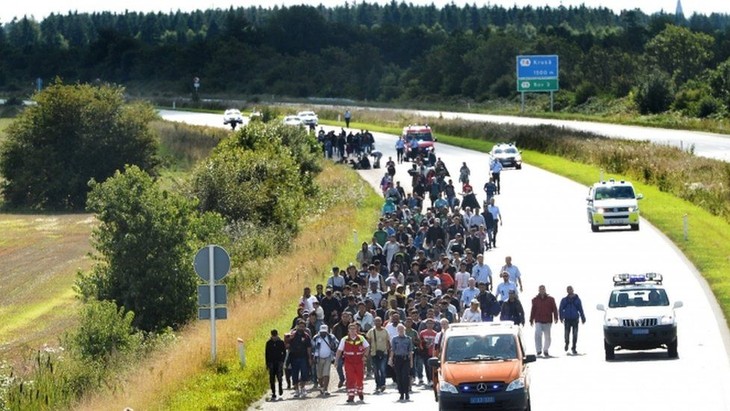(VOVworld)- The migrant crisis in Europe is growing acute as thousands of migrants flood the border areas of EU countries. Inevitably, some conflicts and clashes are occurring and the EU has become divided over quotas and migrant distribution. Thousands of IS militants, disguised as refugees, have entered the EU posing serious challenges to Europe.

A group of migrants crossed into southern Denmark from Germany, forcing the closure of a motorway |
European countries are facing serious challenges posed by the massive migrant wave of African people who are trying to find a better life in Europe. In addition to concerns over economic and social burdens, the migrant wave raises security concerns since IS forces are trying to enter the region.
Terrorists disguised as refugees
A number of IS militants have recently disguised themselves as refugees to migrate into Europe. About 4,000 militants have showed up in EU member countries. They crossed the Turkish border with help from local human traffickers and mixed with illegal migrants. They intend to launch terrorist attacks and establish an Islamic Kingdom all over the world. Islamic State once warned that they would fill Europe with Islamic refugees and turn the streets in Paris into cemeteries.
IS controls a number of regions in Iraq and Syria, and has expanded its activities to Libya where opposition groups are fighting to gain power. IS has always wanted to expand its network to Europe and the worst migrant crisis since World War II is a golden chance for them to penetrate into the region. Over the past few days, thousands of migrants flocked to the Serbian border to cuter Hungary and then Germany, Austria and Finland. Among the migrants, extremists have provoked demonstrations and protests against the local authorities. In Hungary, police blocked a highway that borders Serbia because migrants crossed the barriers to approach the capital city, sparkling clashes between police and the migrants. In southern Denmark, police had to block all the highways because of lines of migrants moving toward the border with Sweden, where the refugee policy is relatively loose. In such waves of migrants, it’s hard for police to differentiate between IS and ordinary refugees. IS penetration into Europe is likely to presage retaliation against the air strikes that the US and its European allies have carried out in the Middle East.
Europe splits over migration issue
The migrant issue has created splits among European countries. A number of European countries have tightened their reception of migrants out of fear of IS penetration. On Wednesday, the European Committee announced a plan to distribute 120,000 refugees among EU nations, with binding quotas. Under the plan, Germany will take 31,000 refugees, France 24,000, and Spain 15,000. Finland and Denmark have also agreed to help the migrants. But many other European countries opposed the plan, saying the reception of migrants should be carried out on a voluntary basis. The Czech Republic strongly denounced the plan. Hungary criticized Germany for encouraging illegal migrants to enter Europe. Hungary has tightened control of its borders, has stopped providing buses to Austria for the migrants, and has strengthened security along its border with Serbia. Austria plans to stop taking in migrants who are stranded in Hungary. The UK says the migrant distribution quota plan is none of its business because it’s not a Schengen member but it will work out a plan to receive refugees. Meanwhile, British MPs warned that compassion would bring about instability in the UK.